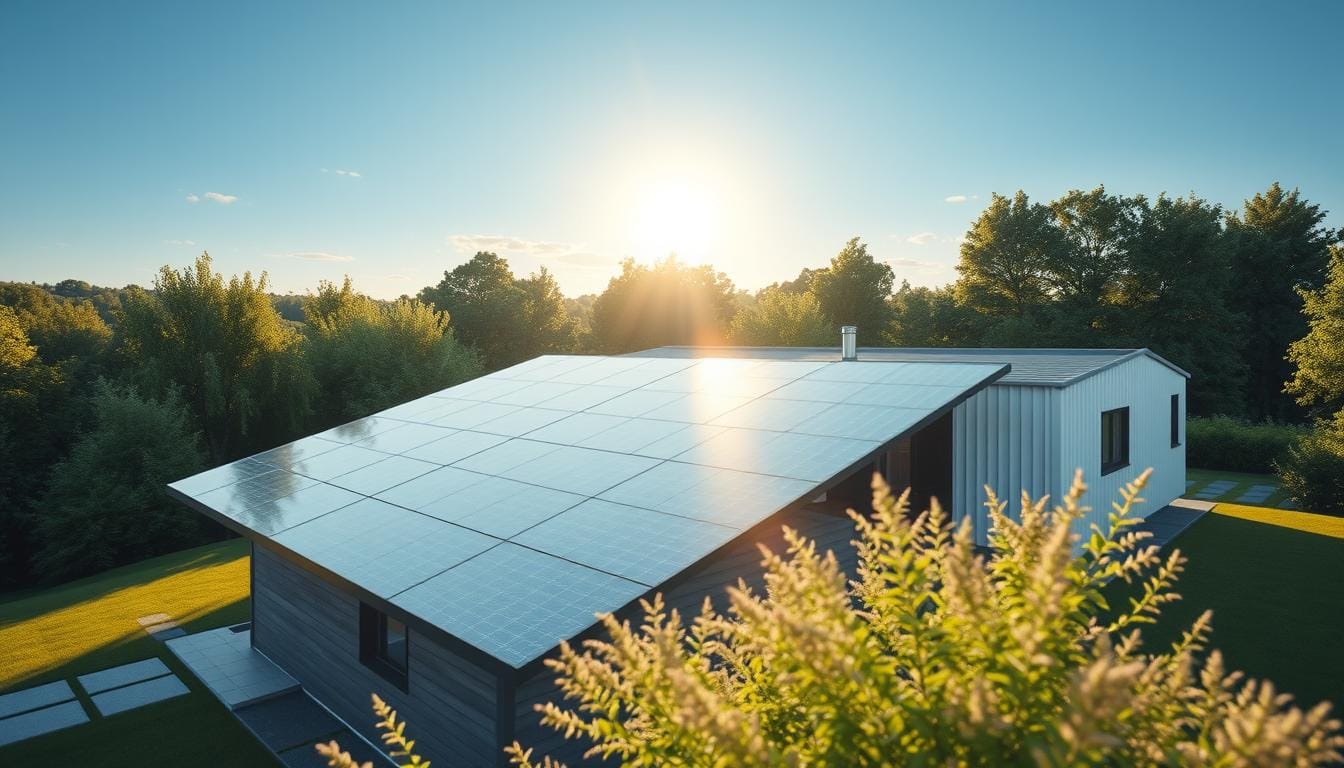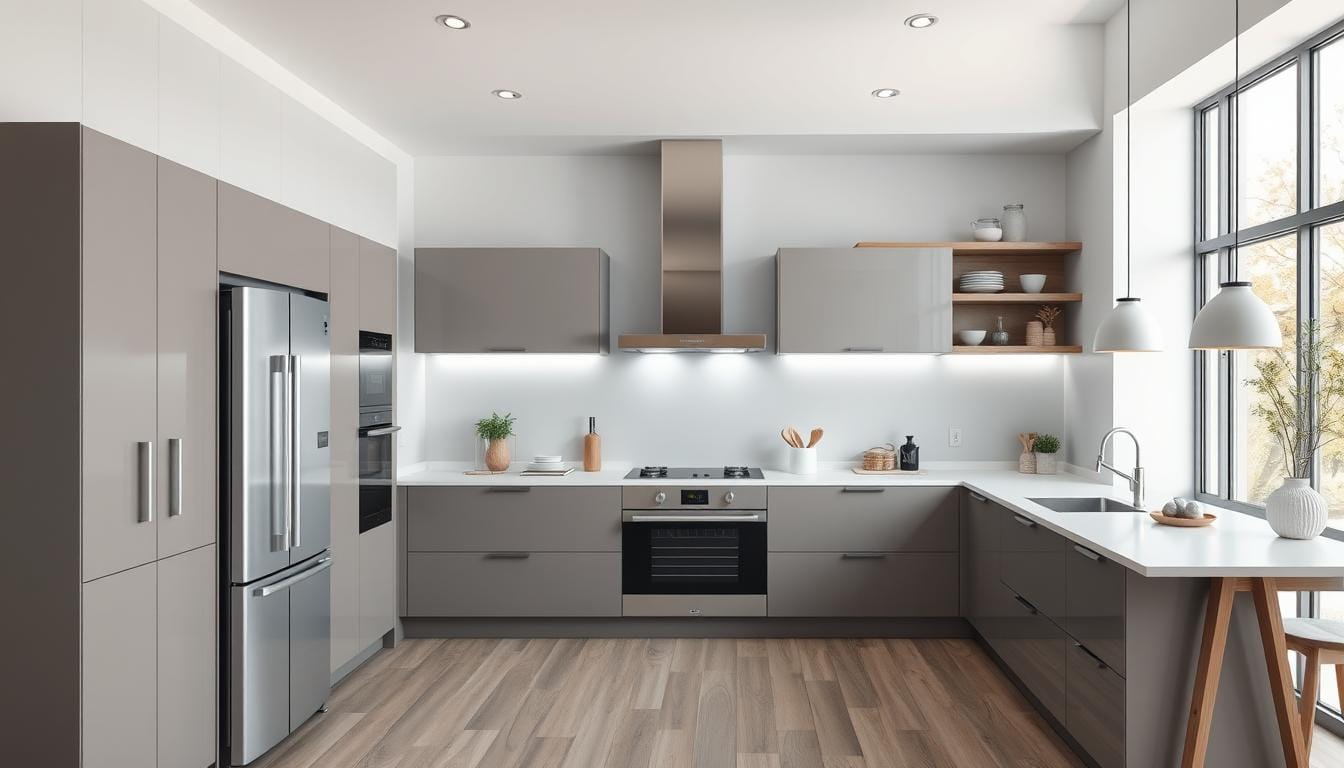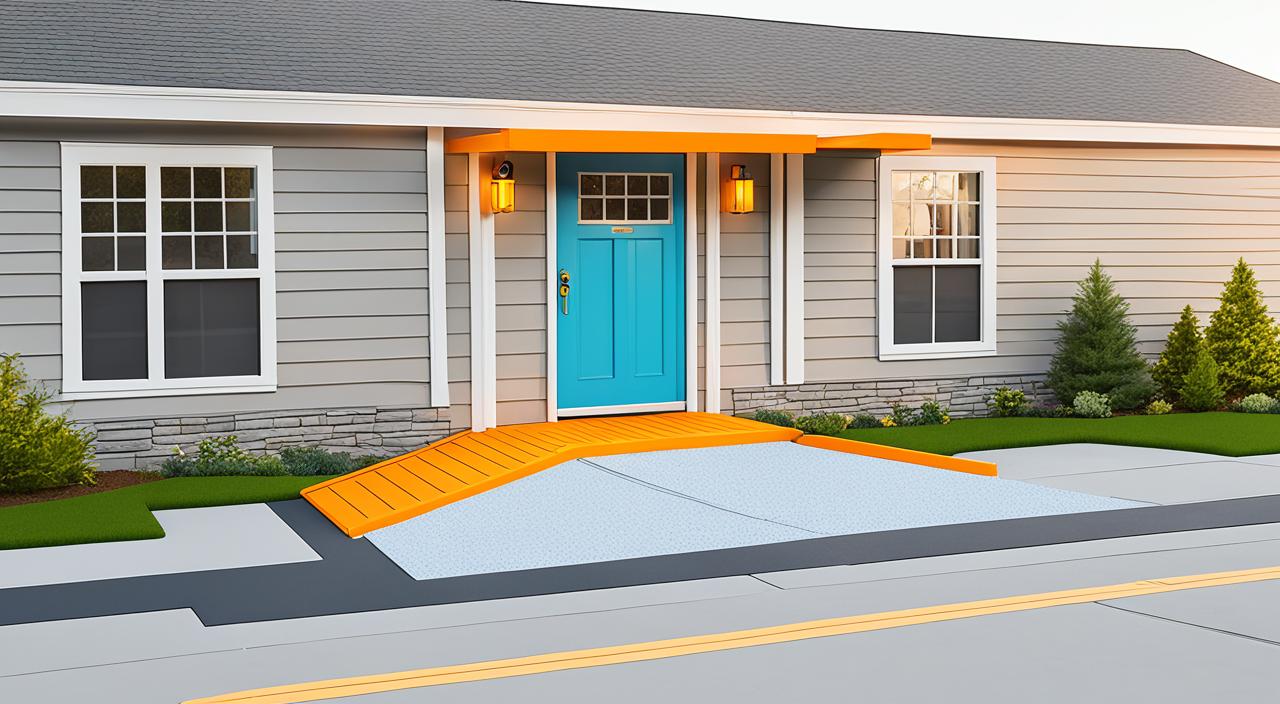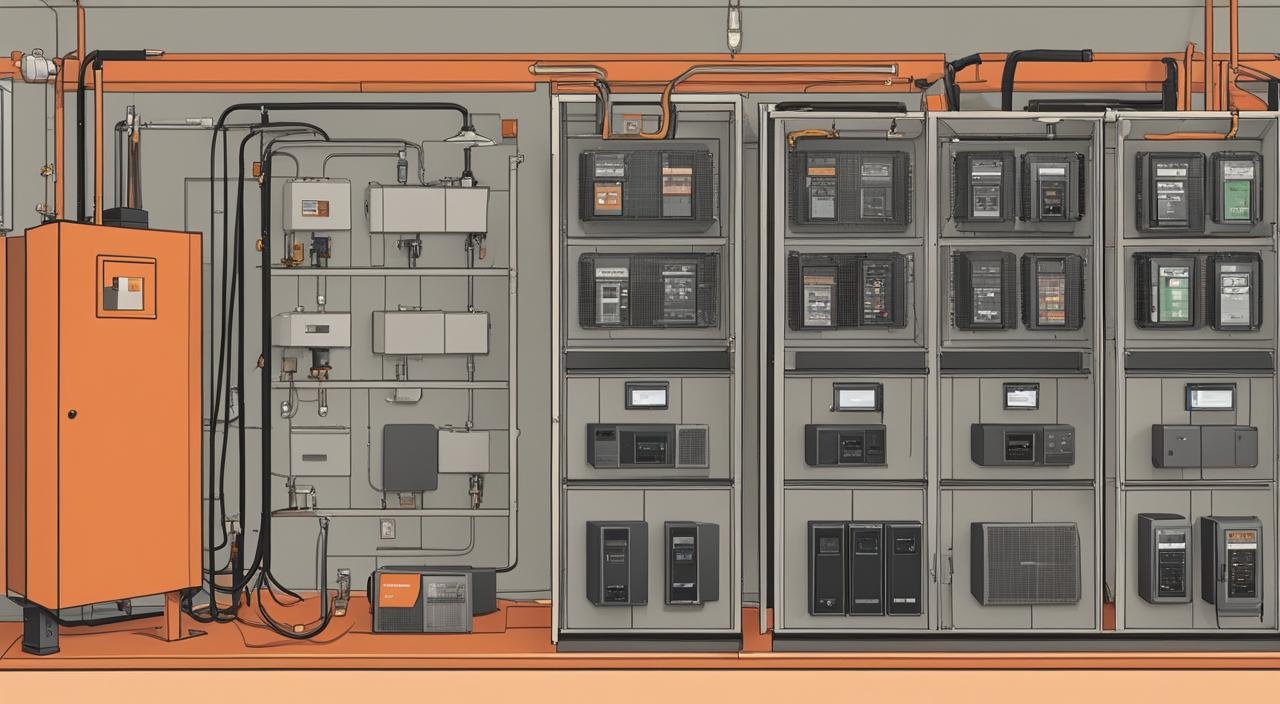Solar panels are a green energy choice for modular homes. They cut down on energy bills and help the planet. In the UK, more people living in modular homes are choosing solar power. This choice fits well with the homes’ flexibility and cost-effectiveness, supporting an eco-friendly way of life.
Places like Sunny Sides Estate and Eco Retreat Park show how solar power benefits communities. It saves money on energy and lowers carbon emissions. Solar panels are key to making homes more sustainable and eco-friendly.
Key Takeaways
- Solar panel prices start at just £4,800 for an 8 Solar Panel System fully installed and MCS Certified.
- Government incentives like the Smart Export Guarantee (SEG) and reduced VAT rates make solar energy more accessible.
- Assessing sun exposure and roof suitability is key before installing.
- Government policies like the Renewable Heat Incentive and the Green Homes Grant scheme support solar adoption.
- Maintaining solar panels involves regular cleaning and performance monitoring to ensure optimal energy production.
Understanding Modular Homes and Their Benefits
The modular home movement is growing fast. It’s key to know what modular homes are and their many benefits. These homes are made in a factory and then put together on-site. This mix of efficiency and green building is a big plus.
What are Modular Homes?
Modular homes, also known as prefabricated or mobile homes, are a new way to build houses. They’re made in sections in a factory, not like traditional homes. This method cuts down on waste and uses efficient, repeatable processes.
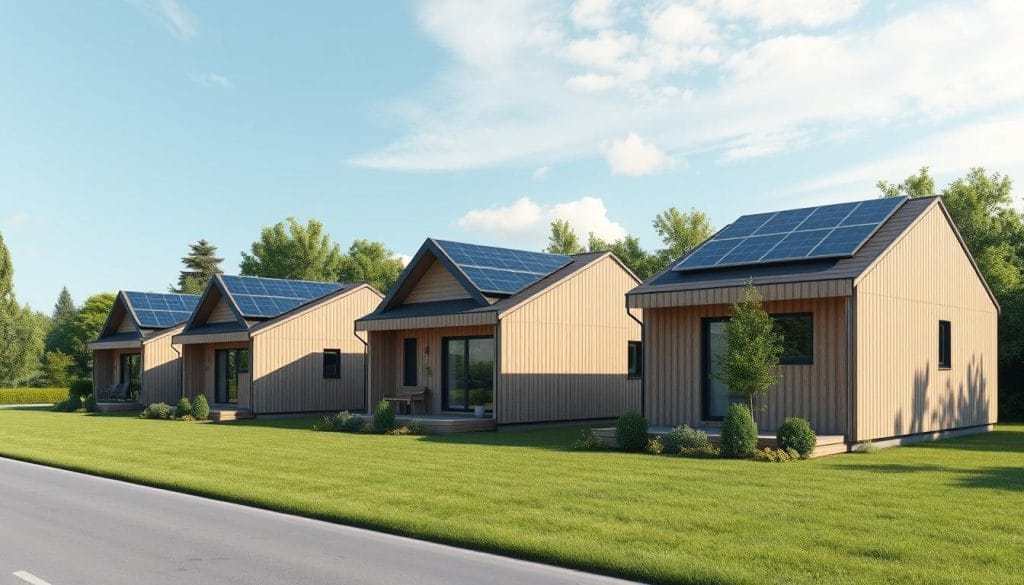
Once ready, the modules are moved to the site and quickly put together. This saves a lot of time, usually just 1-2 weeks, compared to months for traditional homes. The final touches, like cladding and finishing, are done on-site. This lets for more design freedom and choice in materials.
Advantages of Modular Homes
Modular homes have many benefits for different lifestyles. Here are some main advantages:
- Cost Effectiveness: Modular homes are 50% faster to build, which means lower labour costs and less waste. A three-bedroom modular home from Ilke Homes costs around £65,000 – £79,000.
- Quality Control: Building homes in a factory ensures higher quality. It means better consistency and following of building codes.
- Sustainability: Modular homes are eco-friendly. They use less energy and recycle materials, making them better for the planet.
- Durability: Modular homes use strong materials like steel roofing, lasting over 40 years. They also resist damage better than traditional roofs.
- Quick Turnaround: Modular homes are built in about 10 days, then another 2-4 weeks to be ready to live in. This is very fast.
- Energy Efficiency: Modular homes use about 20% less heat than traditional homes, saving on heating costs.
The prefab home industry is always improving, making homes more efficient and green. We help guide you through adopting these new housing solutions. For those wanting to design their own modular home, check out Prefab Market’s design platform.
The Role of Solar Panels in Sustainable Living
Solar panels are key to moving towards sustainable living by using solar energy at home. They help cut down on carbon emissions and reduce our need for non-renewable energy.
Environmental Benefits
Using solar panels has big environmental pluses. They cut down greenhouse gas emissions. Solar energy doesn’t produce emissions, helping fight climate change.
In just one hour, the sun’s energy can meet the world’s energy needs for a whole year. This shows how powerful solar energy is.
Choosing solar panels for homes fits with the United Nations’ goals for clean energy. It helps us use less fossil fuel and creates green spaces in cities.
Financial Savings
Adding solar panels to homes saves money too. They let homes make their own electricity, cutting down on grid use. This means lower energy bills over time.
The UK government helps with solar incentives. The Smart Export Guarantee and the Renewable Heat Incentive make solar panels cheaper. These incentives help cover the cost, encouraging more people to use them.
Building modular homes with solar panels also saves money and time. This makes eco-friendly living more accessible to more people in the UK.
How Solar Panels Integrate with Modular Homes
Solar panels make homes more sustainable and energy-efficient. They fit well with the design of modular homes. This is called design integration for modular homes.
Installation Considerations
Installing solar panels needs careful planning. Homeowners must check if the roof can hold the panels. The panels must face the right direction to catch the most sunlight.
It’s also important to avoid shadows from trees or buildings. This helps the panels work better.
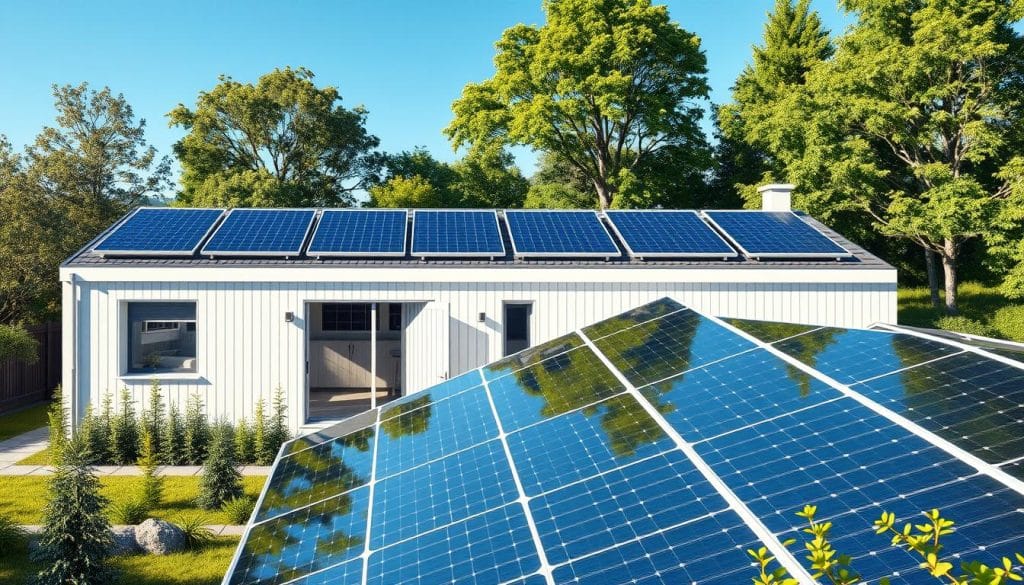
Thinking about moving your home? Solar panels are usually fixed in place. This might mean extra costs to move them. But, some homes are made to be solar-ready, making it easier to add panels later.
Design Compatibility
It’s key to match solar panels with the home’s design. New designs, like solar tiles, look good and work well. They show how solar panels can be both useful and stylish.
Checking how much sun your roof gets is important. This includes looking at the roof’s angle and where you live. This helps create a solar system that saves energy and money over time.
Cost of Solar Panels for Modular Homes
Adding solar panels to modular homes might seem expensive at first. But, the long-term savings and environmental gains make it worth it. It’s key to understand this balance for those thinking about this green investment.
Initial Investment vs. Long-Term Savings
When looking at solar panels for modular homes, compare the start-up costs to long-term savings. In the UK, the cost to install varies from £3,000 to £10,000, based on the home’s size and type. For example:
- Summer house: 10-15 solar panels
- Lodge: 15-20 solar panels
- Park home: 20-25 solar panels
- Motorhome: 2-5 solar panels
- Caravan: 2-3 solar panels
- Travel trailer: 1-2 solar panels
The initial cost is high, but the long-term gains are huge. Modular homes use 3,000 to 5,000 kWh of electricity yearly. Solar panels can cut or eliminate electricity bills, shielding you from price hikes. Plus, they usually come with a 25 to 30-year warranty, ensuring long-lasting performance.
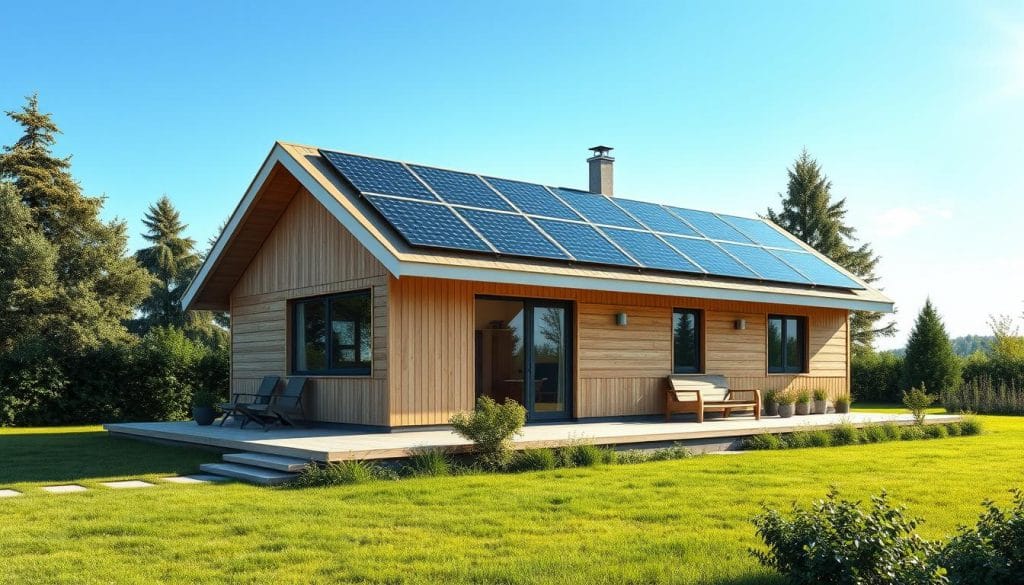
Government Grants and Incentives
There are many government grants to help with the cost. The Smart Export Guarantee (SEG) Scheme lets homeowners earn by sending extra energy to the grid. The Green Homes Grant also helps by covering some of the installation costs, making solar panels more affordable for more people.
The government’s ongoing support makes solar panels more appealing. By using these incentives, homeowners can turn a big upfront cost into a long-term savings and environmental win.
Choosing the Right Solar Panel System
Finding the right solar panel system for your modular home can be tricky. There are many options out there. Knowing about solar panel types and what to look for will guide you.
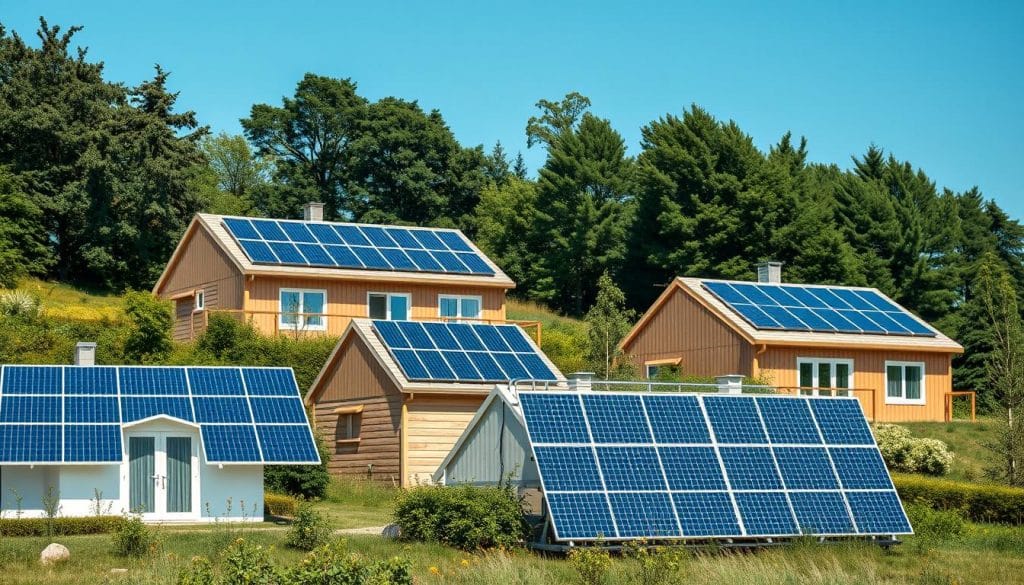
Types of Solar Panels
There are several solar panel types, each with its own benefits:
- Monocrystalline Panels: These panels are very efficient, up to 20%, and last about 50 years. They’re the top choice for homes because they work well and last long.
- Polycrystalline Panels: Less efficient at 15%, but also last about 50 years. They’re cheaper than monocrystalline panels.
- Thin-Film Panels: Include CdTe, a-Si, and CIGS. They’re light, flexible, and affordable but don’t last as long or work as well.
- Hybrid (PV-T) Panels: These mix photovoltaic cells with solar thermal panels. They make more electricity and heat.
- Bifacial Panels: They can make electricity from both sides. This makes them great for high-efficiency setups.
Key Factors to Consider
When picking solar panels for your home, think about:
- Energy Needs: Know how much energy your home uses. Most homes need a 4kWp system.
- Roof Compatibility: Check your roof’s angle, direction, and if it’s shaded. A south-facing roof is best, but east or west can work too. North-facing roofs get 30% less energy.
- Geographical Location: Southern UK gets 20% more solar energy than northern areas. This affects how well panels work.
- Budget: Weigh the upfront cost against long-term savings. Monocrystalline panels cost more but last longer and work better.
- System Warranties and Support: Make sure the provider offers good warranties and support. This helps create a custom, efficient solar system.
- Aesthetic Appeal: Choose a panel type that fits your home’s look. Modular homes have unique designs.
With the right solar technology, you can make your modular home more energy-efficient and green. This saves money and helps the planet.
Legal and Planning Requirements in the UK
Understanding UK solar panel regulations and planning permissions for modular homes is key. It’s vital for a smooth installation. Knowing these rules helps avoid delays and ensures everything goes right.
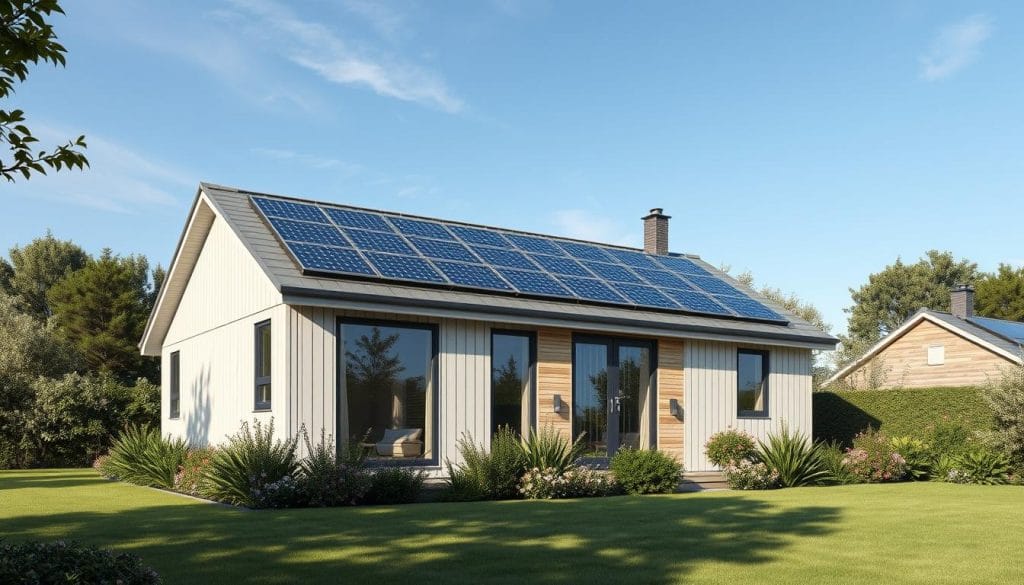
Planning Permission
Getting the right planning permissions is the first step for solar panels in modular homes. Local councils have rules on design and where to place panels. For example:
- Solar panels on walls or roofs should not stick out more than 200mm.
- The top of panels on flat roofs should not go over one metre above the roof’s edge.
- Roof-mounted equipment must be at least one metre from the roof’s edge.
- Wall-mounted equipment should not be near where walls meet or with the roof.
Building Regulations
Following UK solar panel rules means sticking to building regulations for safety and structure. Important points include:
- The total electricity made by the site should not go over 1 megawatt if on the roof.
- Solar panels can’t go on listed buildings, near them, or on sites of historical interest.
- They shouldn’t face highways in areas of beauty, national parks, or heritage sites.
Modular homes in the UK also face Value Added Tax (VAT) rules. These depend on energy standards or if it’s a permanent home.
Planning ahead and working with utility companies is critical. It ensures you follow the law and get the needed approvals for connecting to public utilities.
Maintenance of Solar Panels on Modular Homes
Keeping solar panels on modular homes in good shape is key for their best performance and life span. Regular upkeep boosts energy efficiency and protects the investment in solar tech. We’ll look at how to care for them and fix common problems.
Routine Care and Checks
Regular maintenance is vital for your solar panel system’s efficiency. Clean the panels twice a year to remove dirt and debris. A simple water spray is often enough.
Here are some key points for routine care:
- Inspect panels regularly for physical damage or obstructions.
- Ensure there is no shading from nearby trees or structures.
- Monitor performance using solar monitoring apps provided by solar companies, which can show real-time energy production data.
“Solar panels do not have moving parts, but regular inspections and cleaning are vital for peak performance,” advises NXTGEN Energy Ltd.
Weather affects how often you need to clean your panels. Places with lots of rain might need less cleaning than dry areas where dust builds up.
Troubleshooting Common Issues
Solar panels can face problems, like inverter failure or electrical faults. These can stop the power flow. Catching these early is key.
Key troubleshooting steps include:
- Checking inverter status lights or displays—if an error message appears, consult the manual or a professional technician.
- Inspecting for any disconnections or loose wiring, specially after bad weather.
- Utilising solar monitoring apps to track and compare real-time performance data for any inconsistencies.
For complex tasks, get a pro. NXTGEN Energy Ltd., a top installer in Essex, offers detailed maintenance plans and tests to keep systems running smoothly.
Following these care and troubleshooting tips helps homeowners get the most from their solar panels. This ensures a green and affordable energy source for their homes.
The Future of Solar Energy in the UK
The future of solar energy in the UK looks bright. New technology and a focus on the environment are driving this progress. The UK government wants to triple solar capacity by 2030, thanks to solid policies and incentives.
Trends in Renewable Energy
Large-scale solar projects are on the rise in the UK. Over 1,336 solar farms are already up and running, with plans for over 4,000 more. This shows solar energy’s key role in the UK’s green future.
This year, the UK approved 2GW of solar farm capacity. This is more than in the last 14 years combined. By August 2024, less than one-fifth of the UK’s electricity came from fossil fuels. This marks a big shift towards cleaner energy.
Innovations in Solar Technology
New solar technology is changing how we use solar power at home. Better solar panels, solar roof tiles, and portable options are making solar power more flexible and efficient. Energy storage systems help homes use energy when it’s needed most, reducing grid dependence.
Analysts say solar panel installations are up in August 2024. This is thanks to lower costs and better efficiency. The UK’s Future Homes Standard, starting in 2025, will make new homes more energy-efficient. This, along with plans to increase solar installations, will boost solar energy’s popularity.
Homeowners could save up to £40,000 with solar panels. As we move forward, solar technology will help make renewable energy a part of our daily lives. This signals a brighter, more sustainable future for the UK.

